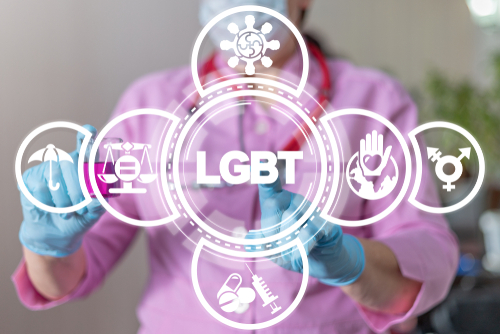Members of the LGBTQ+ community face tremendous hurdles. They lack legal protections in employment and housing in many jurisdictions, and the Supreme Court is currently considering whether business owners can discriminate against them under the guise of “religious freedom.” They have enough issues — accessing health care shouldn’t be one of them. LGBTQ+ individuals face many barriers to care, among them the for-profit health care system in the U.S. However, they also face discrimination, both intentional and negligent, from providers. Medical professionals swear a solemn oath to “first, do no harm,” and this principle extends to treating members of the community with sensitivity.
Implicit Bias and Disparity of Treatment
Clinicians train to treat all patients equally. However, providers can’t check all implicit bias at the hospital door. Implicit bias leads medical professionals to unconsciously use body language or tone of voice to convey negative attitudes toward some patients. For example, imagine a severely obese patient with Type 2 diabetes arrives for his annual checkup snacking on a pastry. His doctor may not say, “Drop that cupcake, stat!” But the doctor’s chiding tone when he recommends the patient make dietary changes to manage the disease makes his exasperation clear. Many stereotypes about members of the LGBTQ+ community aren’t true. For example, many people consider individuals identifying as gay or bisexual as more sexually promiscuous than heterosexuals. In reality, people who identify anywhere along the sexual identity spectrum form committed monogamous relationships with the same frequency as straight, cisgender individuals. Implicit bias can create a disconnect between the patient and their provider. Imagine you’re a gay woman. You visit your doctor seeking information about sperm banks because you and your partner want to start a family. Your physician lectures you about sexually transmitted diseases before giving you a chance to speak. You’d probably feel insulted, making it difficult for you to fully trust your caregiver. People entrust their doctors with the most intimate details of their personal lives. To receive appropriate treatment, they must feel comfortable discussing matters like sexually transmitted diseases. When they mistrust their providers, LGBTQ+ community members hide specifics due to shame, which can lead to adverse health outcomes.
LGBTQ+ Individuals Have Unique Needs That Change Throughout Life
LGBTQ+ individuals have unique health care needs. For example, minority stress drives many to seek temporary relief in alcohol and drugs. As a result, 20 to 30% of gay and transgender people struggle with substance abuse. In comparison, rates fall to less than 10% among cisgender heterosexuals. Because health insurance coverage in the U.S. links to employment, many community members struggle to afford coverage. LGBTQ+ individuals lack legal protection from discrimination on the job in many areas. One in every five people with a different sexual or gender identity reports discrimination in promotion decisions. Many lose their jobs or quit in desperation. As a result, many members of the LGBTQ+ community start over or remain in entry-level positions. Such jobs often offer few, if any, benefits. And because this work pays little, many can’t afford individual coverage policies. They face a barrier to getting the mental and physical health care they need. Youth identifying as LGBTQ+ often face homelessness when they come out and their parents reject them. Fully 40% of homeless teenagers report their sexual or gender identity played a part in their plight. They face rape and assault living on the street. They wrestle with poor nutrition and battle the elements to survive. Older community members often face isolation and loneliness. They grapple with crushing poverty. Many times, their family members disown them. When their partner dies, they have no one to talk to. Because of earlier employment discrimination, they lack the financial resources to fund their retirement. If they must enter a nursing home, they face staff members denying their sexual or gender identity.
Learning the Proper Terminology Matters
Health care providers can improve sensitivity toward community members by learning the correct terminology. Words matter. Addressing individuals correctly serves as the first step in building trust. Learn and use these terms appropriately.
- Gay: A person emotionally or romantically interested in others of the same gender.
- Bisexual: A person interested in members of more than one sex, although not necessarily to the same degree.
- Gender dysphoria: A state of extreme emotional distress created when someone’s physical gender doesn’t correspond with the one they identify as. This term often describes children and adolescents.
- Sexual orientation: An inherent and immutable emotional or sexual attraction to other people.
- Transgender: A person whose gender identity or expression is different from cultural expectations based on the sex they were assigned at birth.
Strategies for Promoting Sensitivity
When treating members of the LGBTQ+ community, health care providers can employ strategies to build a communication bridge. Here, too, sensitivity starts with language. If a patient says, “I’m gay,” use that word to describe their sexual orientation instead of saying “homosexual.” When taking health histories, avoid assumptions. If a patient indicates they’re married, don’t assume their spouse is a member of the opposite sex. Instead of asking a female patient, “Do you have a husband or boyfriend?” ask, “Are you in a committed relationship?” Let the patient guide the conversation. A simple, “What brings you in today?” gives you a starting point for the consultation. Remember, diseases don’t discriminate. Yes, a patient’s sexual or gender identity may contribute to their health concerns — or it may not. Anyone can suffer cardiovascular disease or stroke. Finally, do your best to hide implicit bias. If a patient named Joe walks in wearing high heels and a dress, smile and greet them the same way you would any other patient. Train your staff to check their responses. Quality care begins at the reception desk, and shocked reactions create mistrust even before you welcome the individual to the examination room.
Exhibiting Sensitivity Improves Patient Outcomes for LGBTQ+ Community Members
Members of the LGBTQ+ community face unique health challenges. Medical professionals should build their awareness of their needs and implement strategies to support these individuals. Only then will outcomes improve for all.










